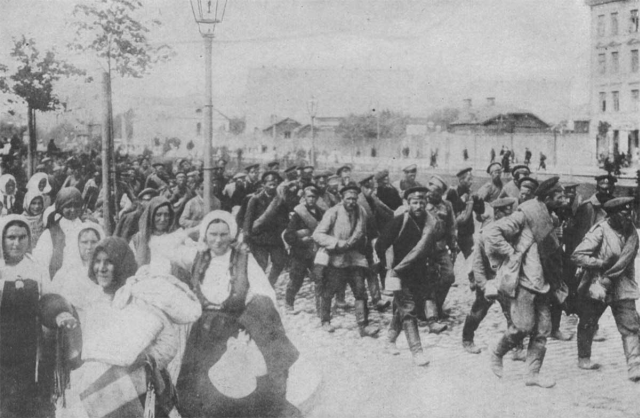The Treaty of Bucharest
Romanias campaign of 1916-1917 ended with the Treaty of Bucharest signed in Buftea in 1918.

Steliu Lambru, 06.03.2017, 13:07
Romanias military campaign of 1916-1917 ended with the Treaty of Bucharest signed in Buftea in May 1918. Following the installation of the Soviet regime in Russia after the Bolshevik Revolution, the new power in Saint Petersburg denounced the war as an imperialist act and decided to end its involvement in the war.
Left on its own on the entire eastern front, Romania was forced to request a peace deal as well, which translated into very harsh conditions. Russias leaving the war was a heavy blow to Romania, and was felt like a betrayal. The Romanian army was unable to face the German offensive on its own, due to the loss of human lives caused by typhus fever. This was made worse by the anarchy caused by the 1 million Russian soldiers supporting the Bolshevik revolution. Peace was therefore seen as the only means of salvaging what could still be salvaged.
Historian Sorin Cristescu tells us more about the context in Europe in which Russia left the war and in which the two successive peace deals were signed:
Sorin Cristescu: “Russias exiting the war following the Bolshevik coup of November 7th 1917 led to the start of peace talks. Lenin was brought from Switzerland by the Germans, via Sweden and Finland, for this very purpose: to stage a coup that would take over power and sign a separate peace deal so the Germans troops could move from Russia to France and win the war. The Treaty of Brest-Litovsk was signed on the 3rd of March 1918, followed by the signing of the Treaty of Bucharest with Romania on the 7th of May 1918. This was a bad deal for Romania, which lost control of its mountain borders to Austria-Hungary. Also, Dobrogea became a German-Bulgarian condominium, with Romania only maintaining an access path. Its oil wells were leased for 90 years, so indeed, this was an enslaving peace deal.
Under the Treaty of Bucharest, Romania had to cede southern Dobrogea to Bulgaria and even part of northern Dobrogea, a region that had never belonged to Bulgaria. Also, Romania ceded control of the passes in the Carpathian Mountains to Austria-Hungary. In compensation, although this was not stated in the Treaty, the Central Powers agreed to the union of Bessarabia with Romania. The reason behind it was that the Central Powers did not want to spark too much hostility among the Romanian population over the territorial losses and the leasing of its resources.
The Treaty was ratified by the Romanian Parliament in the summer of 1918, but it has never been promulgated by King Ferdinand I of Romania. Fortunately, the provisions of the Treaty were valid for six months alone, because at the end of October 1918, the government led by Alexandru Marghiloman declared them null, and Romania resumed hostilities. In spite of all appearances, Sorin Cristescu believes, the Treaty of Bucharest was a good one for Romania.
Sorin Cristescu: No matter how enslaving the conditions were for Romania, the peace treaty signed in Buftea-Bucharest was a huge diplomatic victory for the Triple Entente, also acknowledged as such by the German Parliament. Some German MPs said that, “from this moment onwards, no one can sit at the negotiating table with us. It became obvious that the Central Powers, their leaders, more specifically, were a gang of thieves, criminals looting the countries they defeated, and never again could the diplomats of the Central Powers engage in negotiations with anyone else. The US had already entered the war and introduced a policy whereby “my enemy will never be my negotiation partner, my enemy is a petty criminal and if I lay hands on him, Ill bring him to justice. The idea that Central Power leaders could ever hold negotiations with anyone again was abandoned for good. Of course, posters were printed in France, reading “Look what a peace made by the Central Powers looks like! and “Do they want peace? Yes, but let us defeat them first! The more disastrous the peace conditions were for us, the bigger the diplomatic defeat and the blow on the credibility of the German diplomacy.
Sorin Cristescu says the Germans had started losing credibility much earlier, even before 1918:
Sorin Cristescu: This happened in 1918. But back in 1914, when newspapers quoted Bethmann-Hollweg, the German chancellor, as responding to Englands declaration of war with the words, “will you go to war over a scrap of paper? everyone said that the German diplomacy sees treaties as useless pieces of paper. The treaty that guaranteed Belgiums neutrality was signed in 1831 by the representatives of England, France and Prussia. After Bucharest was seized on December 6, 1916, on December 12 a rather vague peace offer was sent to the Entente by the Central Powers. The answer came several days later. The Entente said that peace was out of the question, that the offer had been made by people who first thought they would win the war in three months time but after 2 years of fighting realised they would never reach their goals. The final act was the signing of the two peace treaties, in Brest-Litovsk and Bucharest, respectively, which simply ruled out German diplomats as possible negotiation partners.
Although the end of the war found Romania on the winners side, the peace treaty of Buftea-Bucharest remained a bad memory which has never been completely erased.
(translated by: Cristina Mateescu, Diana Vijeu)





























